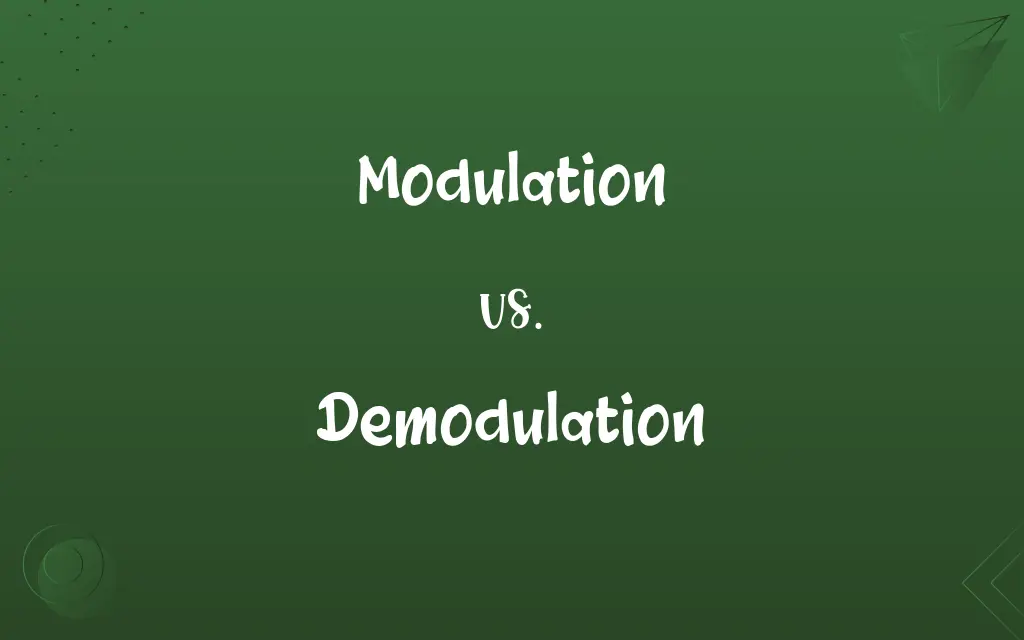Modulation vs. Demodulation: Know the Difference

By Shumaila Saeed || Published on February 26, 2024
Modulation is the process of varying a carrier signal to encode information, while demodulation is the reverse process of extracting the original information from the modulated signal.

Key Differences
Modulation is a technique used in communication systems where the properties of a carrier signal are varied according to the information signal. This is essential for transmitting data over long distances. Demodulation, conversely, is the process of extracting the original information-bearing signal from the modulated carrier wave. It is the necessary counterpart in the receiver part of a communication system.
Shumaila Saeed
Feb 26, 2024
The purpose of modulation is to adapt an information signal, typically a low-frequency signal, to be suitable for transmission through a high-frequency medium, such as radio waves. This is done by altering amplitude, frequency, or phase of the carrier wave. Demodulation serves to reverse this process, recovering the original low-frequency information signal from the characteristics of the received high-frequency wave.
Shumaila Saeed
Feb 26, 2024
Various techniques are used in modulation, such as Amplitude Modulation (AM), Frequency Modulation (FM), and Phase Modulation (PM), each with its method of encoding data onto a carrier signal. Demodulation requires corresponding methods to decode these specific types of modulation, with techniques like AM demodulation, FM demodulation, and so on.
Shumaila Saeed
Feb 26, 2024
In practical applications, modulation helps in efficiently utilizing the bandwidth of the transmission medium and reduces the effects of noise and interference. This makes the transmission more robust and reliable. Demodulation, on the other hand, must effectively separate the carrier signal from noise and accurately recover the original information, which is critical for the integrity of received data.
Shumaila Saeed
Feb 26, 2024
Modulation can also be digital, such as Quadrature Amplitude Modulation (QAM) or Phase-Shift Keying (PSK), which are used in digital communication systems. These methods encode digital information in the carrier signal. Demodulation in digital systems involves decoding these patterns to retrieve the original digital data, which requires precise synchronization and signal processing.
Shumaila Saeed
Feb 26, 2024
ADVERTISEMENT
Comparison Chart
Definition
Encoding information onto a carrier
Extracting original information from a carrier
Shumaila Saeed
Feb 26, 2024
Primary Purpose
Adapt signal for transmission
Recover original signal from transmission
Shumaila Saeed
Feb 26, 2024
Techniques
AM, FM, PM, QAM, PSK
Corresponding methods for each modulation type
Shumaila Saeed
Feb 26, 2024
Role in Communication
Essential for transmitting data
Critical for receiving and interpreting data
Shumaila Saeed
Feb 26, 2024
Complexity and Signal Processing
Varies based on modulation type
Requires precise demodulation techniques
Shumaila Saeed
Feb 26, 2024
ADVERTISEMENT
Modulation and Demodulation Definitions
Modulation
Modulation can change amplitude, frequency, or phase.
“Amplitude modulation changes the amplitude of the carrier wave with the information signal.”
Shumaila Saeed
Jan 24, 2024
Demodulation
Demodulation retrieves original data from a modulated signal.
“A radio receiver demodulates FM signals to produce audio.”
Shumaila Saeed
Jan 24, 2024
Modulation
Modulation alters a carrier wave to encode information.
“FM radio uses frequency modulation to encode audio signals.”
Shumaila Saeed
Jan 24, 2024
Demodulation
Demodulation involves reversing modulation processes.
“In demodulation, the original signal's frequency is extracted from the carrier wave.”
Shumaila Saeed
Jan 24, 2024
Modulation
Modulation is vital in both analog and digital communication.
“Digital TV signals use modulation to transmit digital data over airwaves.”
Shumaila Saeed
Jan 24, 2024
ADVERTISEMENT
Demodulation
Demodulation is crucial for interpreting transmitted information.
“Demodulation is performed by a modem to decode internet data.”
Shumaila Saeed
Jan 24, 2024
Demodulation
Demodulation is essential in digital communication systems.
“Digital demodulation decodes digital data from modulated carrier signals.”
Shumaila Saeed
Jan 24, 2024
Demodulation
Demodulation techniques vary with modulation methods.
“Different demodulation techniques are required for AM and FM signals.”
Shumaila Saeed
Jan 24, 2024
Demodulation
The conversion of a modulated carrier wave into a current equivalent to the original signal. Also called detection.
Shumaila Saeed
Jan 24, 2024
Demodulation
The inverse of the effect of modulation, or applying a signal to a carrier.
A radio transmitter applies modulation to a carrier wave and the receiver applies demodulation to it to recover the message.
Shumaila Saeed
Jan 24, 2024
Modulation
A change in stress, pitch, loudness, or tone of the voice; an inflection of the voice.
Shumaila Saeed
Jan 24, 2024
Demodulation
(electronics) the reception of a signal by extracting it from the carrier wave
Shumaila Saeed
Jan 24, 2024
Modulation
(Physics) The variation of a property of a wave, beam, or signal, such as its amplitude, frequency, speed, or phase.
Shumaila Saeed
Jan 24, 2024
Modulation
The variation and regulation of a population, physiological response, etc.
Shumaila Saeed
Jan 24, 2024
Modulation
The act of modulating, or the state of being modulated; as, the modulation of the voice.
Shumaila Saeed
Jan 24, 2024
Modulation
A change of key, whether transient, or until the music becomes established in the new key; a shifting of the tonality of a piece, so that the harmonies all center upon a new keynote or tonic; the art of transition out of the original key into one nearly related, and so on, it may be, by successive changes, into a key quite remote. There are also sudden and unprepared modulations.
Shumaila Saeed
Jan 24, 2024
Modulation
The alteration of hte amplitude, intensity, frequency, or phase (of the carrier wave of a radio signal) at intervals, so as to represent information to be transmitted.
Shumaila Saeed
Jan 24, 2024
Modulation
(electronics) the transmission of a signal by using it to vary a carrier wave; changing the carrier's amplitude or frequency or phase
Shumaila Saeed
Jan 24, 2024
Modulation
A manner of speaking in which the loudness or pitch or tone of the voice is modified
Shumaila Saeed
Jan 24, 2024
Modulation
The act of modifying or adjusting according to due measure and proportion (as with regard to artistic effect)
Shumaila Saeed
Jan 24, 2024
Modulation
Modulation adapts signals for effective transmission.
“Modulation is necessary to send data over long-distance communication channels.”
Shumaila Saeed
Jan 24, 2024
Modulation
Modulation helps in reducing noise and interference.
“Frequency modulation is less susceptible to noise compared to amplitude modulation.”
Shumaila Saeed
Jan 24, 2024
Repeatedly Asked Queries
What does demodulation do?
Demodulation extracts the original information from a modulated carrier signal.
Shumaila Saeed
Feb 26, 2024
What is modulation in communication?
Modulation is varying a carrier signal’s properties to encode information.
Shumaila Saeed
Feb 26, 2024
Why is modulation necessary?
Modulation allows efficient and reliable data transmission over various media.
Shumaila Saeed
Feb 26, 2024
How does demodulation work?
Demodulation reverses the modulation process to recover the original signal.
Shumaila Saeed
Feb 26, 2024
What is digital modulation?
Digital modulation involves encoding digital information onto a carrier signal.
Shumaila Saeed
Feb 26, 2024
How important is demodulation in digital communication?
It’s crucial for accurately retrieving digital data from modulated signals.
Shumaila Saeed
Feb 26, 2024
Are there limitations to modulation?
Modulation can be limited by bandwidth and susceptibility to noise.
Shumaila Saeed
Feb 26, 2024
What are common types of modulation?
Common types include AM, FM, and Phase Modulation.
Shumaila Saeed
Feb 26, 2024
Can modulation improve signal strength?
Modulation doesn’t increase signal strength but makes transmission more efficient.
Shumaila Saeed
Feb 26, 2024
Is demodulation the same for all modulation types?
No, demodulation methods are specific to the modulation type used.
Shumaila Saeed
Feb 26, 2024
What role does demodulation play in radios?
In radios, demodulation extracts audio signals from radio waves.
Shumaila Saeed
Feb 26, 2024
How complex is demodulation in digital systems?
It can be complex, requiring precise signal processing and synchronization.
Shumaila Saeed
Feb 26, 2024
What is Frequency Modulation?
Frequency Modulation varies the frequency of the carrier wave to encode information.
Shumaila Saeed
Feb 26, 2024
What's the difference between AM and FM demodulation?
AM demodulation recovers signal from amplitude changes, FM from frequency changes.
Shumaila Saeed
Feb 26, 2024
Can modulation secure communication?
Certain modulation techniques can enhance communication security.
Shumaila Saeed
Feb 26, 2024
What does an AM demodulator do?
It extracts the original audio signal from an amplitude-modulated carrier.
Shumaila Saeed
Feb 26, 2024
How has modulation evolved in telecommunications?
Modulation has evolved to support higher data rates and more efficient transmission.
Shumaila Saeed
Feb 26, 2024
What challenges exist in demodulation?
Demodulation challenges include noise filtering and signal distortion handling.
Shumaila Saeed
Feb 26, 2024
Is demodulation necessary for all types of communication?
Yes, for any modulated communication, demodulation is essential for decoding the data.
Shumaila Saeed
Feb 26, 2024
Does modulation affect data speed?
Modulation can impact data transmission speed and efficiency.
Shumaila Saeed
Feb 26, 2024
Share this page
Link for your blog / website
HTML
Link to share via messenger
About Author
Written by
Shumaila SaeedShumaila Saeed, an expert content creator with 6 years of experience, specializes in distilling complex topics into easily digestible comparisons, shining a light on the nuances that both inform and educate readers with clarity and accuracy.








































































